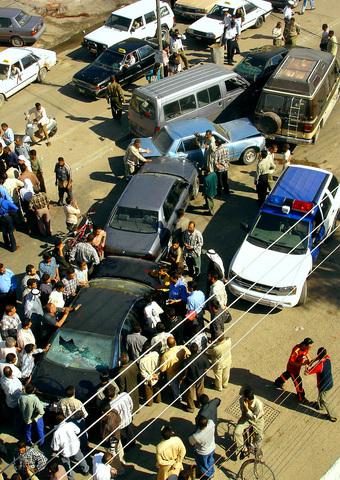Militants killed five police officers -- including a police commissioner -- on the second anniversary of the US-led invasion of Iraq, as the insurgency pressed on with its tactic of targeting Iraqi security forces, Shiites and Kurds and focusing less on US troops.
Newly elected Shiite and Kurdish leaders marked the March 19, 2003, start of the war with a fresh promise to form a government by the end of the month, when the National Assembly convenes for only the second time, nearly two months after lawmakers were elected.
In Waco, Texas, US President George W. Bush said "the Iraqi people are taking charge of their own destiny."

PHOTO: AP
In his weekly radio address, Bush saluted the more than 1,500 troops who have died in the war.
"I know that nothing can end the pain of the families who have lost loved ones in this struggle, but they can know that their sacrifice has added to America's security and the freedom of the world," he said. "Because of our actions, freedom is taking root in Iraq, and the American people are more secure."
In violence Saturday, gunmen killed Ahmed Ali Kadim, a Baghdad regional police commissioner, as he traveled to his office in the Doura neighborhood. In the oil-rich northern city of Kirkuk, attackers killed a policeman, then bombed his funeral procession, killing three other officers, including the cousin of Jalal Talabani, the Kurdish leader pegged to become Iraq's next president.
A suicide attacker trying to kill US troops in the insurgent stronghold of Ramadi, 112km west of Baghdad, prematurely detonated his car bomb, killing only himself, Iraqi police and the US military said.
Despite the continuing attacks, the top US general in Iraq, Army General George Casey, said recently that the level of violence against US troops had dropped significantly since the Jan. 30 elections. That appeared to be the result of a tactical shift by the insurgency, made up mostly of Sunni Arabs who were dominant under Saddam, to focus violence on majority Shiites and Kurds, two groups persecuted under the dictator's Baath Party rule.
The Jordanian-born terrorist mastermind Abu Musab al-Zarqawi and his al-Qaeda in Iraq group have said they hope their relentless wave of bombings, kidnappings and beheadings will lead to a sectarian war.
Shiites make up about 60 percent of Iraq's 26 million people, while Sunni Arabs make up about 20 percent of the population. Kurds, who are Sunni but mostly secular, make up 15 to 20 percent.
Sunni Arabs mostly stayed away from the elections, either because they feared reprisals or because they chose to boycott them.
"The terrorists have one policy. They want to prevent the formation of a democratic government and want to draw the people of Iraq into a sectarian war," said Ali al-Faisal, a member of the Shiite clergy-backed United Iraqi Alliance.
"In the past, they were targeting the American forces because they were in charge of security. After the new Iraqi army and police were established, and succeeded in maintaining security and began annihilating them, they shifted their attacks. But they will fail because there is a real intent to fight terrorism," al-Faisal said.

MONEY GRAB: People were rushing to collect bills scattered on the ground after the plane transporting money crashed, which an official said hindered rescue efforts A cargo plane carrying money on Friday crashed near Bolivia’s capital, damaging about a dozen vehicles on highway, scattering bills on the ground and leaving at least 15 people dead and others injured, an official said. Bolivian Minister of Defense Marcelo Salinas said the Hercules C-130 plane was transporting newly printed Bolivian currency when it “landed and veered off the runway” at an airport in El Alto, a city adjacent to La Paz, before ending up in a nearby field. Firefighters managed to put out the flames that engulfed the aircraft. Fire chief Pavel Tovar said at least 15 people died, but

LIKE FATHER, LIKE DAUGHTER: By showing Ju-ae’s ability to handle a weapon, the photos ‘suggest she is indeed receiving training as a successor,’ an academic said North Korea on Saturday released a rare image of leader Kim Jong-un’s teenage daughter firing a rifle at a shooting range, adding to speculation that she is being groomed as his successor. Kim’s daughter, Ju-ae, has long been seen as the next in line to rule the secretive, nuclear-armed state, and took part in a string of recent high-profile outings, including last week’s military parade marking the closing stages of North Korea’s key party congress. Pyongyang’s official Korean Central News Agency (KCNA) released a photo of Ju-ae shooting a rifle at an outdoor shooting range, peering through a rifle scope

South Korea would soon no longer be one of the few countries where Google Maps does not work properly, after its security-conscious government reversed a two-decade stance to approve the export of high-precision map data to overseas servers. The approval was made “on the condition that strict security requirements are met,” the South Korean Ministry of Land, Infrastructure and Transport said. Those conditions include blurring military and other sensitive security-related facilities, as well as restricting longitude and latitude coordinates for South Korean territory on products such as Google Maps and Google Earth, it said. The decision is expected to hurt Naver and Kakao

India and Canada yesterday reached a string of agreements, including on critical mineral cooperation and a “landmark” uranium supply deal for nuclear power, the countries’ leaders said in New Delhi. The pacts, which also covered technology and promoting the use of renewable energy, were announced after Indian Prime Minister Narendra Modi and Canadian Prime Minister Mark Carney hailed a fresh start in the relationship between their nations. “Our ties have seen a new energy, mutual trust and positivity,” Modi said. Carney’s visit is a key step forward in ties that effectively collapsed in 2023 after Ottawa accused New Delhi